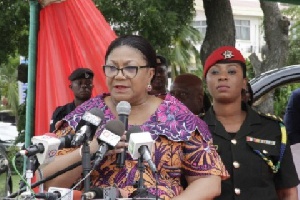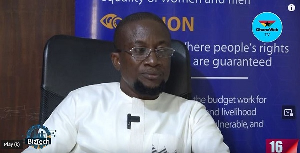The First Lady, Mrs Rebecca Akufo-Addo, on Wednesday cut the sod for the construction of a new Paediatric Intensive Care Unit at the Korle-Bu Teaching Hospital (KBTH) in Accra.
The new facility is urgently needed to help provide emergency services and save the lives of children that are referred to the Paediatric and Neonates Unit at the Department of Child Health at the Hospital.
It is expected to be a modern fully equipped Paediatric Intensive Care Unit (PICU) for the Children’s Block, which would take care of children that are admitted through the emergency ward and are either Intensive Care or High Dependency patients.
The Korle-Bu Teaching Hospital, as the leading national referral centre in Ghana, receives patients including children, from all the regions in Ghana and from other West African countries like Togo, Benin, Cote d’Ivoire, Burkina Faso, Sierra Leone and The Gambia.
The Children’s Block at Korle-Bu has, for so many years, been working under some tough conditions with deplorable facilities, extreme congestion and lack of adequate equipment making treatment extremely difficult, hence, the urgent need of a facelift to provide optimum care for children.
Authorities of the Hospital, therefore, took the opportunity of the visit of the First Lady last February, 2017, to appeal to her, through her Rebecca Foundation, to assist in getting a new PICU for the Teaching Hospital.
The requests included the construction of a hostel for parents of children on cancer treatment, which was progressing steadily and that of the new Paediatric Intensive Care Unit.
Mrs Akufo-Addo took the challenge up and, through her Rebecca Foundation, and in consultation with the Management of the Hospital, prepared the grounds to cut the sod, marking the beginning of the construction of the new centre.
Speaking at the brief sod-cutting event, the First Lady said it was very painful and tragic for one to lose one’s child, especially under dehumanising conditions and lack of proper and appropriate facility.
Mrs Akufo-Addo stated that the status of the Hospital as a leading referral centre in West Africa required the need to make sure the quality of care was absolutely the best in the sub-region.
She said the facility would help improve the working conditions of doctors and nurses, and that the building would have its own fully furnished changing rooms, resting rooms, ablution facilities with showers, offices and consultation rooms.
“We all expect our health staff to be professional and do their best. And this is right. But no matter how professional, experienced or dedicated they are, they cannot work without the right resources and that includes space and equipment.
“Hopefully this unit will help our health professionals to deliver quality healthcare to our children,” she said.
Whilst emphasising on the commitment of the Rebecca Foundation to supporting the health sector, she asked the Ministry of Health, the Ghana Health Service and the Board and Management of Korle Bu, to ensure that there were the right numbers and calibre of staff essential to quality health service delivery.
She expressed gratitude to the Foundation’s partners and donors and assured all of its commitment to resolve to continue providing interventions that support the well-being of women and children.
Dr Felix Kwaku Anyah, the Chief Executive Officer of the Korle-Bu Teaching Hospital, thanked the First Lady for responding to the call to go to the aid of the Hospital.
“Korle-Bu needs many projects of this kind to deliver quality healthcare to meet international benchmarks; we equally need the right policies that will facilitate the changing of attitudes and providing the appropriate organisational culture towards meeting these international benchmarks,” he noted.
The new KBTH Paediatric Unit would be built within an area of 1,500 square meters, including the main building, access areas and supporting infrastructure.
To continue with the effort of providing infrastructure that requires lower operating costs, the building would be EDGE certified by the IFC (World Bank Group).
It would use strong durable materials that would offer significant savings in energy, water and carbon footprint versus similar structures.
The new PICU would be able to admit 41 children through six different areas; five in main Paediatric Intensive Care Room, one Paediatric ICU Isolation Room, 14 in Paediatric High Dependency Room, 10 in Neonatal ICU Room, seven in Neonatal High Dependency Room, and four in Neonatal Isolation Room.
Health News of Thursday, 31 May 2018
Source: ghananewsagency.org

















